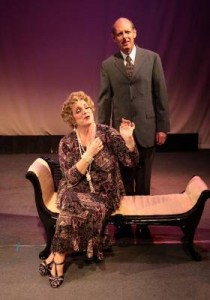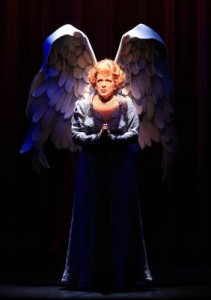
Several decades before Mrs. Elva Miller (known affectionately as “Mrs. Miller”) blithely and cluelessly massacred such 1960s hits as “Downtown” and “A Lover’s Concerto” in her vibrato-heavy, wobbly, off-key mezzo, there was an even more celebrated “pure coloratura” who achieved now legendary fame in the operatic concert world by performing arias in a voice that makes Mrs. Miller’s seem nearly magnificent by comparison.
This diva was Mrs. Florence Foster Jenkins (1968-1944), a frustrated “soprano” who came into considerable fortune at the age of 60, and embarked on a “career” on the concert stage which led to her appearing at none other than Carnegie Hall.
In Souvenir (A Fantasia On The Life Of Florence Foster Jenkins), his 2005 Broadway comedy with music, Stephen Temperley introduced contemporary audiences to Mrs. Jenkins’ “artistry” and gave the phenomenal Judy Kaye a role which scored her a Tony nomination.
I had the great good fortune to catch Kaye’s breathtaking performance during the play’s short-lived 2006 tour. I fell in love with Temperley’s play, and was delighted to learn that Tom McCoy was bringing Souvenir back, as the opening production of McCoy Rigby’s 2008-2009 season. Even better news is this: As Jenkins, Linda Edwards gives a performance that easily rivals Kaye’s, a three-dimensional portrayal of a woman so talentless and yet so innately loveable that it is no wonder audiences flocked to see her perform, yet did their best to hide from Jenkins that the tears she brought to their eyes were tears of laughter.
First and foremost, Souvenir is an honest-to-goodness full-fledged play, not just a series of concert highlights (or should that be lowlights?). More specifically, it is a memory play, as seen through the eyes of Cosme McMoon, a gay pianist/composer almost 40 years Mrs. Jenkins’ junior, who took on the job as her accompanist because songwriting was not paying the rent (nor was his recently departed roommate who “moved out somewhat abruptly after a dispute over the meaning of monogamy”).
“People used to say to me, ‘Why does she do it?,’” Cosme tells us in his opening monolog. “I always thought the better question was, ‘Why did I?’” Certainly some of Cosme’s willingness to lower himself to Jenkins’ level came from the realization that “I was already twenty-nine and losing my hair.” As for Jenkins, she herself had no doubts that she had found “an accompanist at one’s own level.” (After all, not many singers have the “perfect pitch” Jenkins prided herself on.)
When first we meet Mrs. Jenkins, nothing about her society matron manner (think Margaret Dumont of Marx Brothers fame) gives us any hint of the astonishing shock we feel when first we hear the god-awful bleats and yelps and wails that emit from her elegantly lipsticked mouth. Over the course of Souvenir’s two acts, we will hear her slaughter the music of Mozart, Verdi, Gounod, and Brahms, among others. We will also fall a bit in love with Mrs. J., as Cosme certainly did.
The play’s title comes from a scene in which Cosme quite sensibly tries to persuade Jenkins not to record Mozart’s all but unsingable “Queen Of The Night.” No, replies Mrs. Flo. “Queen Of The Night” is the perfect choice because “in days to come, when my voice is not perhaps as strong as it is now, (we shall) be able to hear it as it once was! In all its glory! A lovely souvenir.”
At moments like this, Cosme can do nothing but stifle his frustration at having to humor Jenkins (after all, his paycheck depends on it). The scene is which Cosme attempts to explain syncopation to the rhythmically challenged Jenkins, is almost worth the price of admission. Yet persevere Cosme does, and holds his tongue yet again.
No wonder it comes as a shock to Mrs. Flo when, in one of Souvenir’s most memorable scenes, the had-it-up-to-here pianist finally lets his boss have it. His subsequent realization that he has gone much too far leads to an touching moment in which Cosme uses his own gifts as a singer/pianist to charm Jenkins into forgiving him. (“Here is where we have a showdown. You’re too high-hat. I’m too low-down. Walkin’ along Broadway. Soon the high-brow has no brow. Ain’t it a shame? And I’m to blame. . .”)
The second act is devoted to Jenkins’ preparation for her concert at Carnegie Hall and the actual concert itself, for which Mrs. Flo has designed a different costume for each aria and song, including Gounod’s “Jewel Song” from Faust, Mozart’s aforementioned “The Queen of the Night” from The Magic Flute, and, as a tribute to “our boys in uniform, “Praise the Lord and Pass the Ammunition,” sung in military khaki.
Edwards, like Kaye, which whom she has frequently been compared, is a trained soprano with a lengthy resume which includes musicals, operas, and plays. Only a highly skilled singer could “choreograph” her voice to so perfectly imitate Jenkins’ incessant and unintentional vocal gaffes. Only a highly talented actress could make the potentially cartoonlike Jenkins into a real, loveable, three-dimensional human being. (At last night’s Q&A, Tom McCoy promised to bring Edwards back as Mrs. Lovett in Sweeney Todd, a recent Kaye role, and one that Edwards is sure to sing and act the bejezus out of.)
Because Souvenir is so much Mrs. Jenkins’ (and by extension Edwards’) show, the actor playing opposite her tends to get lost in his leading lady’s shadow. Not so Carl J. Danielsen, whose Cosme is every bit the acting showcase that Edwards’ Jenkins is. As joyful as it is to watch Edwards’ over the top antics, it is equally entertaining to observe Danielsen’s double-takes, slow burns, and Charlie Brown “Oh good grief!” head bangings. That Danielsen is a proficient accompanist for Edwards, and quite a fine singer himself (“Crazy Rhythm,” “It All Depends On You,” “Violets For Your Furs”) makes his achievements here even more notable.
Jason Edwards (Linda’s brother) has directed Souvenir to perfection, never allowing either lead performance to descend into caricature. Gary Wissman’s scenic design effortlessly transforms the set from piano bar to Upper Manhattan apartment to concert stage, aided in great measure by R. Kent Sheranian’s lighting and Josh Bessom’s sound design. Bridget Bartlett’s 14 spectacular costume changes for Edwards capture the many facets of Jenkins’ personality and song repertoire.
Near the end of Souvenir comes a moment of such sublime beauty that I will say nothing to give it away, but what a payoff Temperley and Edwards give us for our two hour investment in Florence Foster Jenkins’ life.
It’s not often that a play can prove laughs and gasps in almost equal measure, but Souvenir does just that, plus a tear or two. In the gifted hands of Edwards and Danielsen, Souvenir (it means “memory” in French) is quite memorable indeed.
La Mirada Theatre for the Performing Arts, 14900 La Mirada Boulevard, La Mirada.
www.lamiradatheatre.com
–Steven Stanley
September 16, 2008
Photos: Scott Treadway




 Since 2007, Steven Stanley's StageSceneLA.com has spotlighted the best in Southern California theater via reviews, interviews, and its annual StageSceneLA Scenies.
Since 2007, Steven Stanley's StageSceneLA.com has spotlighted the best in Southern California theater via reviews, interviews, and its annual StageSceneLA Scenies.







 COPYRIGHT 2024 STEVEN STANLEY :: DESIGN BY
COPYRIGHT 2024 STEVEN STANLEY :: DESIGN BY